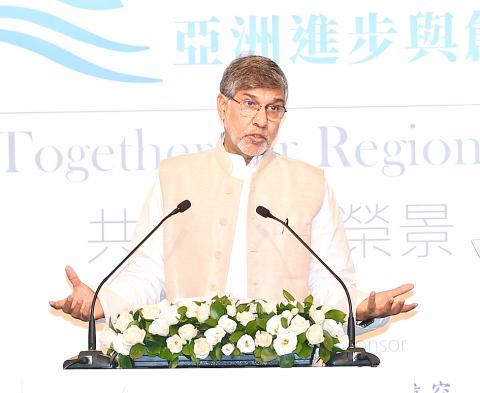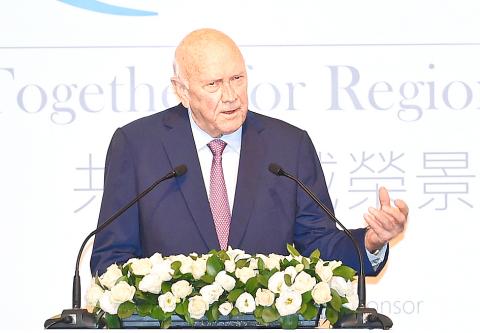Nobel Peace Prize laureate Kailash Satyarthi yesterday applauded Taiwan-led initiatives to engage and empower younger generations to make positive changes.
In a keynote address to the Yushan Forum in Taipei, the Indian laureate said respecting the voices of young people is an important way to find solutions to the many problems afflicting humanity.
“Today I would urge you to prioritize developing our children and young people in the world. No sustainable change, no sustainable peace, no sustainable prosperity is possible without respecting young people in the world,” he said.

Photo: Fang Pin-chao, Taipei Times
Satyarthi, the founder of the Bachpan Bachao Andolan (Save Childhood Movement), which campaigns for the rights of children, shared the 2014 Nobel Peace Prize with then-Pakistani teenager Malala Yousafzai.
Taiwan is like his “second home,” because he has hundreds of “children” who live here, he said, referring both to his second visit to the Taipei and to the Taiwanese volunteers who have worked over the past 10 years at Bal Ashram, his group’s rehabilitation and training center, which caters to the special needs of child labor victims.
Taiwan sends the largest number of volunteers for human services and support in Africa, Asia and other countries around the world in terms of the percentage of population, he said.

Photo: Fang Pin-chao, Taipei Times
“Though Taiwan is a small country, people have a big heart,” he said.
He hailed President Tsai Ing-wen (蔡英文) for her New Southbound policy, adding: “When everybody looks at the North and the West, you have that leadership that looks southbound. Thanks for that.”
The Yushan Forum was inaugurated in October last year as a platform to promote cooperation among nations targeted by the New Southbound policy. This year’s two-day meeting is focused on engagement among young leaders in the region.
Another Nobel peace laureate, former South African president F.W. de Klerk, discussed the role of leaders in guiding change and innovation.
Instead of listening to what the people want and then giving it to them, “the real challenge for real leadership is to convince people what is best for them,” even if achieving that goal might take some sacrifices, he told the forum.
In the long run, the vision would benefit them and, more importantly, the next generation, he said.
After identifying the need, the next challenge for a leader is to formulate a concise goal before convincing his or her voters to back it up, he said.
Taking his country as an example, he said South Africa and its people “were caught up in the downward spiral of violence and continuing repression” in the 1980s.”
“We were in the wrong place. We had to admit to ourselves that where we stood is morally indefensible and therefore we have to change fundamentally,” he said.
US Environmental Protection Agency Principal Deputy Assistant administrator Jane Nishida told the forum that Taiwan’s contributions to environmental protection is a source of inspiration for countries in the region.
Taiwan has made great progress in tackling environmental issues over the past 20 years, including water and air pollution and electronic waste management, Nishida said.
Countries around Asia have been drawn to Taiwan’s example, which is being shared under the International Environmental Partnership, a longtime collaboration between her agency and the Environmental Protection Administration, she said.
“Taiwan has now become a leader in environmental protection and a true global example,” she said.

Chinese spouse and influencer Guan Guan’s (關關) residency permit has been revoked for repeatedly posting pro-China videos that threaten national security, the National Immigration Agency confirmed today. Guan Guan has said many controversial statements in her videos posted to Douyin (抖音), including “the red flag will soon be painted all over Taiwan” and “Taiwan is an inseparable part of China,” and expressing hope for expedited reunification. The agency last year received multiple reports alleging that Guan Guan had advocated for armed reunification. After verifying the reports, the agency last month issued a notice requiring her to appear and explain her actions. Guan

GIVE AND TAKE: Blood demand continues to rise each year, while fewer young donors are available due to the nation’s falling birthrate, a doctor said Blood donors can redeem points earned from donations to obtain limited edition Formosan black bear travel mugs, the Kaohsiung Blood Center said yesterday, as it announced a goal of stocking 20,000 units of blood prior to the Lunar New Year. The last month of the lunar year is National Blood Donation Month, when local centers seek to stockpile blood for use during the Lunar New Year holiday. The blood demand in southern Taiwan — including Tainan and Kaohsiung, as well as Chiayi, Pingtung, Penghu and Taitung counties — is about 2,000 units per day, the center said. The donation campaign aims to boost

The Kaohsiung Tourism Bureau audited six hotels in an effort to prevent price gouging ahead of Korean band BTS’ concert tour in the city scheduled for Nov. 19, 21 and 22 this year. The bureau on Friday said that the audits — conducted in response to allegations of unfair pricing posted on social media — found no wrongdoing. These establishments included the local branches of Chateau de Chine, Hotel Nikko, My Humble House, and Grand Hai Lai, it said, adding that the Consumer Protection Commission would have penalized price gougers had the accusations been substantiated. The bureau said the Tourism Development Act

The Central Weather Administration (CWA) said a magnitude 4.9 earthquake that struck off the coast of eastern Taiwan yesterday was an independent event and part of a stress-adjustment process. The earthquake occurred at 4:47pm, with its epicenter at sea about 45.4km south of Yilan County Hall at a depth of 5.9km, the CWA said. The quake's intensity, which gauges the actual effects of a temblor, was highest in several townships in Yilan and neighboring Hualien County, where it measured 4 on Taiwan's seven-tier intensity scale, the CWA said. Lin Po-yu (林柏佑), a division chief at the CWA's Seismological Center, told a news conference